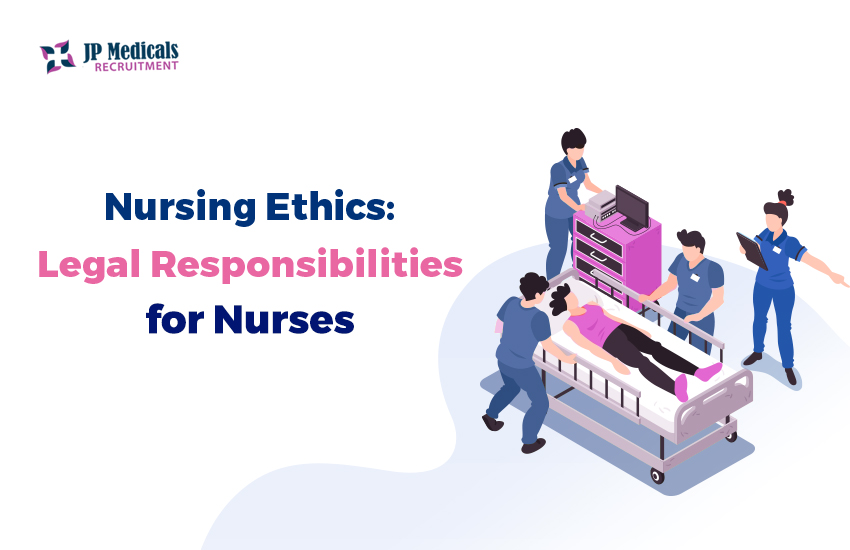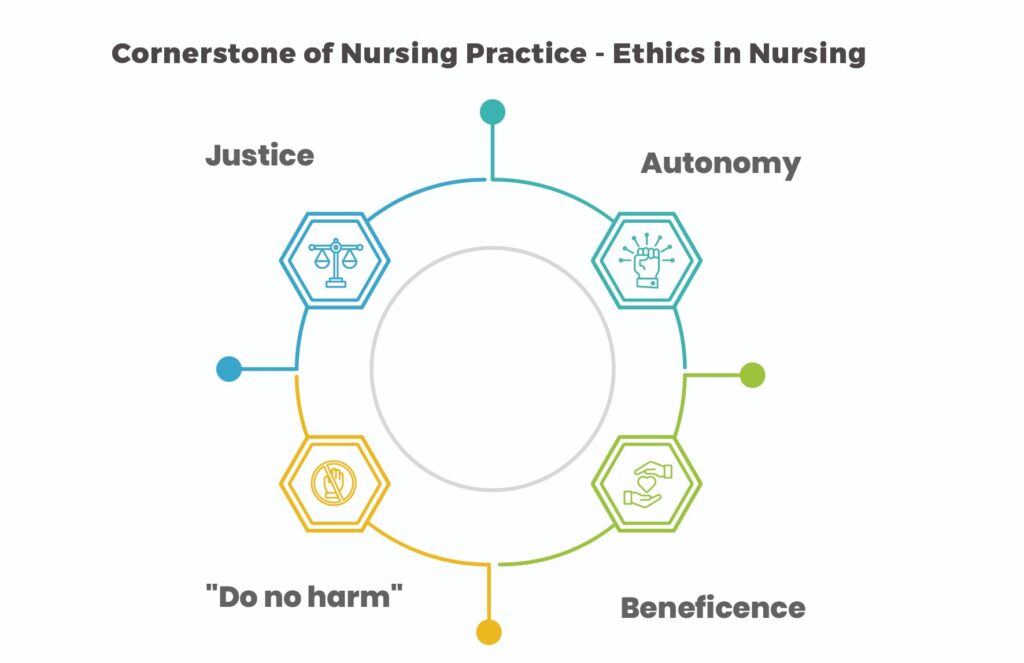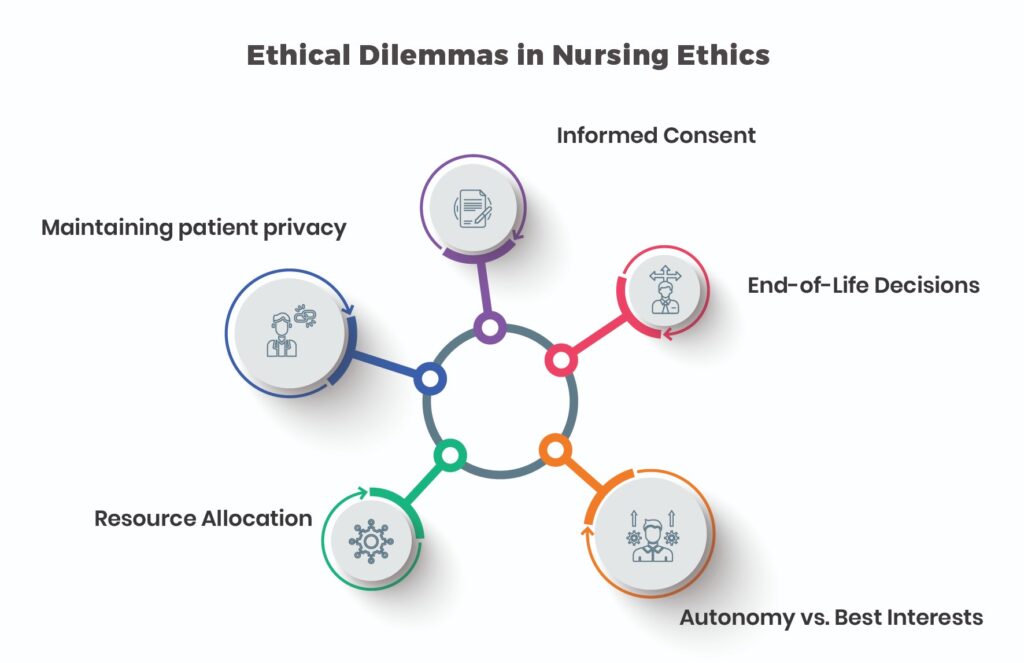Ethical and Legal Challenges in Nursing: Navigating Complexities in Patient Care
Introduction: 60% of Nurses Face Legal and Ethical Dilemmas Weekly

Nursing ethics and the law underpin patient care. However, 60% of nurses face legal or ethical difficulties at least once a week, making split-second judgments that could affect patient lives and careers. Recognizing patient rights and legal obligations is about protection, advocacy, and ethical, high-quality care, not just compliance.
Actually, nursing is rarely black and white. These issues can be overwhelming, from patient autonomy to secrecy. We’ll discuss nurses’ major legal and ethical challenges and how to overcome them in this blog.
Understanding Ethics in Nursing: 90% of Nurses Face Ethical Dilemmas
Whenever we discuss nursing ethics, we are talking about the moral principles that are responsible for determining every decision about patient care. There are studies that demonstrate that 90% of nurses face ethical issues in the course of their work. These dilemmas frequently arise in high-pressure settings where the distinction between right and evil is not always evident.
In order to ensure that patient care continues to be compassionate, fair, and responsible. Ethics play a critical role in guiding nurses through these problems. Not only do they promote efficiency, but they also promote respect and integrity in every healthcare setting. They have an impact on how nurses engage with patients, families, and colleagues.
The following fundamental ethical precepts serve as the cornerstone of nursing practice:

Nursing Ethics: Principle #1 Autonomy
This principle places a strong emphasis on upholding a patient’s ability to choose their own medical treatment. By giving patients all the information they need and honoring their decisions, even when they deviate from what is expected of them, nurses promote autonomy.
Nursing Ethics: Principle #2 Beneficence
Beneficence is all about taking care of patients well. By providing compassionate care and advocating for patients, nurses work to advance well-being. According to research, patients are more satisfied and stick to treatment regimens when nurses actively support their needs (American Nurses Association).
Nursing Ethics: Principle #3 “Do no harm”
“Do no harm” is the essence of non-maleficence. This idea serves as a reminder to nurses to refrain from doing anything that can endanger a patient’s health. A National Academy of Medicine paper states that minimizing injury is essential to guaranteeing patient safety in medical environments.
Nursing Ethics: Principle #4 Justice
Treating every patient equally, irrespective of their background, is a key component of fair care. According to the World Health Organization, nurses are essential in promoting fair treatment, which has been demonstrated to enhance the health of underserved populations.
5 Common Ethical Dilemmas in Nursing Ethics

5 Common Ethical Dilemmas Nurses Face Every Day
Nurses frequently find themselves in difficult situations where right and wrong are ambiguous due to ethical issues that arise on a daily basis. They frequently encounter the following problems:
Informed Consent
It might be challenging to get patients to give their informed consent when they might not fully comprehend their treatment alternatives. Informing patients and honoring their autonomy are two things that nurses must strike a balance between.
End-of-Life Decisions
Nurses often have difficult choices regarding whether to switch to palliative care or continue aggressive treatments when caring for patients who are near death, frequently in emotionally charged situations.
Autonomy vs. Best Interests
The delicate dance between a patient’s desires and what medical professionals think is best is known as autonomy vs. best interests. For instance, nurses may have to choose between honoring a patient’s preferences and standing up for their rights when the patient declines a life-saving surgery.
Resource Allocation
In emergency situations where resources are scarce, nurses must prioritize treatment, which may include making morally challenging choices about who receives immediate attention.
Maintaining patient privacy
While promoting effective communication can be challenging, especially in familial contexts where opinions on disclosure differ.
4 Main Legal Framework Governing Nursing Ethics Practice
Acts pertaining to Nurse Practice: Every state has a Nurse Practice Act that describes the legal framework for nursing, the area of practice, and the qualifications for licensure. These laws guarantee that nurses fulfill particular competency and educational requirements.
- Certification and Licensure
In order to practice in a state, nurses must obtain a license, which requires passing the NCLEX-RN exam and completing continuing education requirements.
- HIPAA
HIPAA stands for Health Insurance Portability and Accountability Act. This federal regulation requires nurses to handle patient data properly while protecting patient privacy and guaranteeing the confidentiality of health information.
- Patient Protection and Affordable Care Act (ACA)
This statute broadens healthcare access while protecting patient rights, influencing how nurses provide care and advocate for their patients.
- Advance Directives and Living Wills
These documents allow patients to express their healthcare preferences, assisting nurses in honouring their intentions for end-of-life care.
5 Key Reasons to Understand Patient Rights and Legal Responsibilities

Common Legal Challenges in Nursing
- Patient injury from poor care is malpractice.
- Accidental injury (e.g., prescription errors, insufficient assessments) is negligence.
- Incorrect dose or drug administration might have serious repercussions.
- Inaccurate patient records pose legal dangers.
- Poor informed consent before operations or treatments.
Conclusion: Embracing Ethical and Legal Integrity in Nursing
In order to protect patient safety, uphold professional integrity, and promote confidence in the healthcare system, nurses must address ethical and legal issues. Nurses can carry out their duties with compassion and assurance if they comprehend the nuances of these problems and use practical solutions.
As your nursing career progresses, think about getting in touch with JP Medicals Recruitment Services. Our specialty is healthcare locum services and recruitment, and we provide best practices to help you advance your career. As you further your professional development, join us in promoting high standards in nursing practice!





